Water Heater Replacement Cost and Consumer Guide
$1,440 Average Cost
As Low As $600 As High As $12,000
$480 to $2760 50 Gallons
How much replacing your water heater will cost depends on the type of water heater you plan on getting, the size, the brand and many other factors.
To help you beyond giving the estimates above, we will go into detail about the cost of replacing a water heater according to your preferences as well as your household needs.
It’s a real bummer when your water heater suddenly stops working! It’s importance in the household is immeasurable and one that often goes unappreciated until you realize that no hot water is coming out of of the faucet. According to Energystar, 7.8 million water heaters are replaced annually. That is a big number! That is why I decided to make this cost guide to help you out, in case you need to replace yours.
The average cost of replacing a water heater is around $1,440. This amount is heavily influenced by the size and type of heater you use among other things. Based on these factors it can be as low as $600 to as high as $12,000. Whether you DIY it or call for professional help will also contribute to the total cost.
The cost of replacing a water heater is dependent on several factors, which makes it difficult to precisely estimate the cost. So, in this article, I will go through the factors that affect the cost of replacing a water heater, along with some other information you might find helpful. So. Without further ado, let’s get right to it.
Average Cost
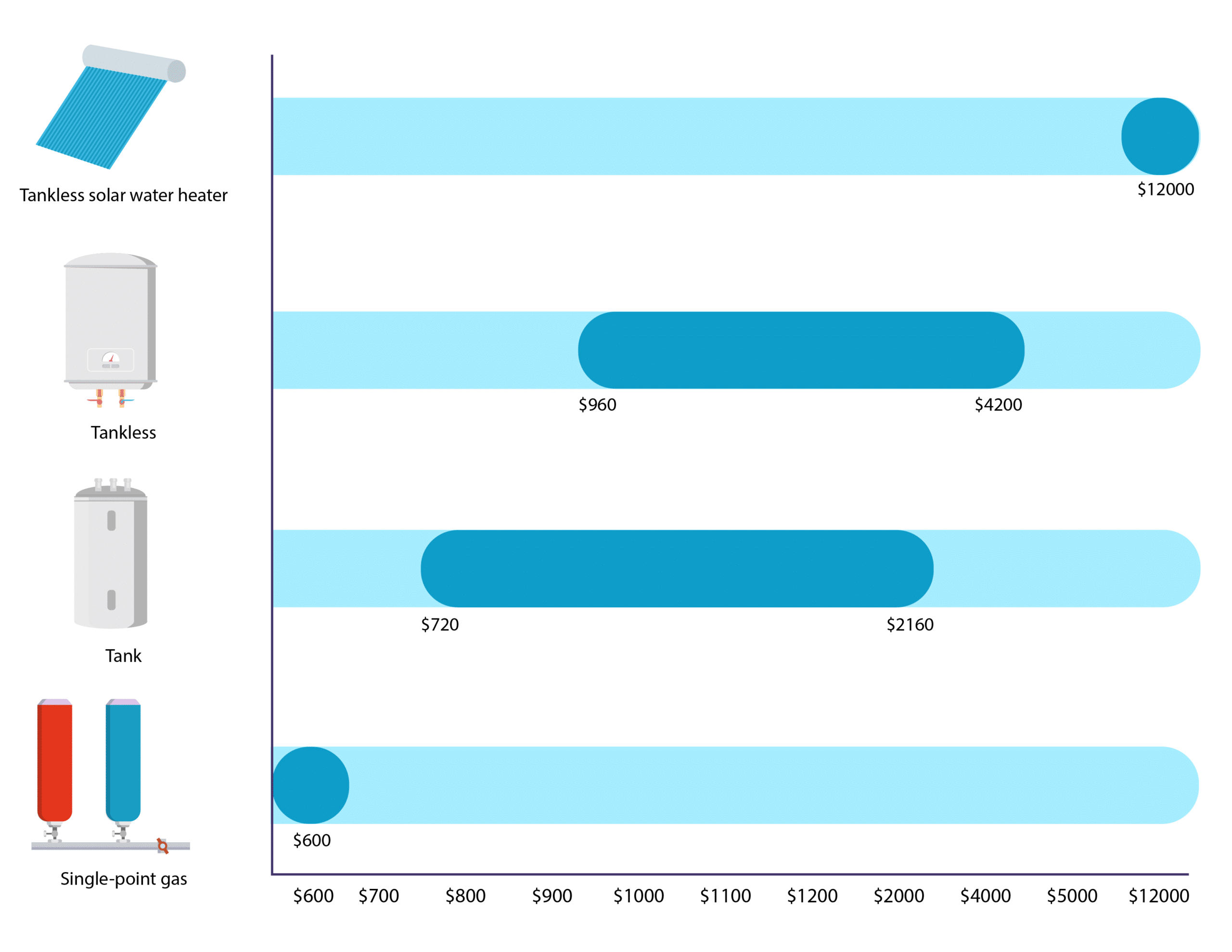
The national average cost of replacing a water heater is around $1,440. Generally, a tank water heater costs $720 to $2,160 to replace, whereas a tankless water heater costs $960 to $4,200 or even more.
However, one of the cheapest possible solutions for a tankless water heater can be a single-point gas water heater, which will cost you about $600 only. On the other hand, the cost can go as high as $12,000 if you need a tankless solar water heater for a family of five.
Now, if you need a new 40 or 50-gallon water heater, it will cost you approximately $400 to $2,400 for only the unit. However, the labor cost for this project might be about $240 to $1,200. Besides, installing a gas water heater costs between $120 and $840 more than installing an electric one.
Factors that Drive Costs
Several factors, such as the size and type of the heater, whether it is tanked or tankless, and the brand influence the costs of replacing a water heater. The following are some of the factors that drive costs:
Heater Size
Tank water heaters come in a variety of sizes, ranging from 30-gallon versions to 80-gallon models. Larger families require large water heaters to supply enough hot water for their daily necessities, whereas smaller versions are appropriate for small families having one or two members.
Well, size is a huge factor in determining the cost of replacement. GPM (Gallons per minute) and temperature rise are the two factors that determine the size of a tankless water heater.
The table below shows the average costs of water heaters of different sizes:
Size | Average Cost | Family Size |
|---|---|---|
30 Gallon | $360-$1,080 | 2 |
40 Gallon | $420-$1,800 | 3 |
50 Gallon | $480-$2,760 | 4 |
75 Gallon | $960-$3,600 | 6 |
80 Gallon | $1,200-$3,840 | 7+ |
However, the cost in the table shows only the price for the tank unit. It doesn’t include labor costs or other installation costs. If you want to know the cost of the other factors, keep on reading.
Tanked vs Tankless
The two most common styles of water heaters are tanked and tankless. So, let’s discuss the cost of two of them:
Tanked Water Heater
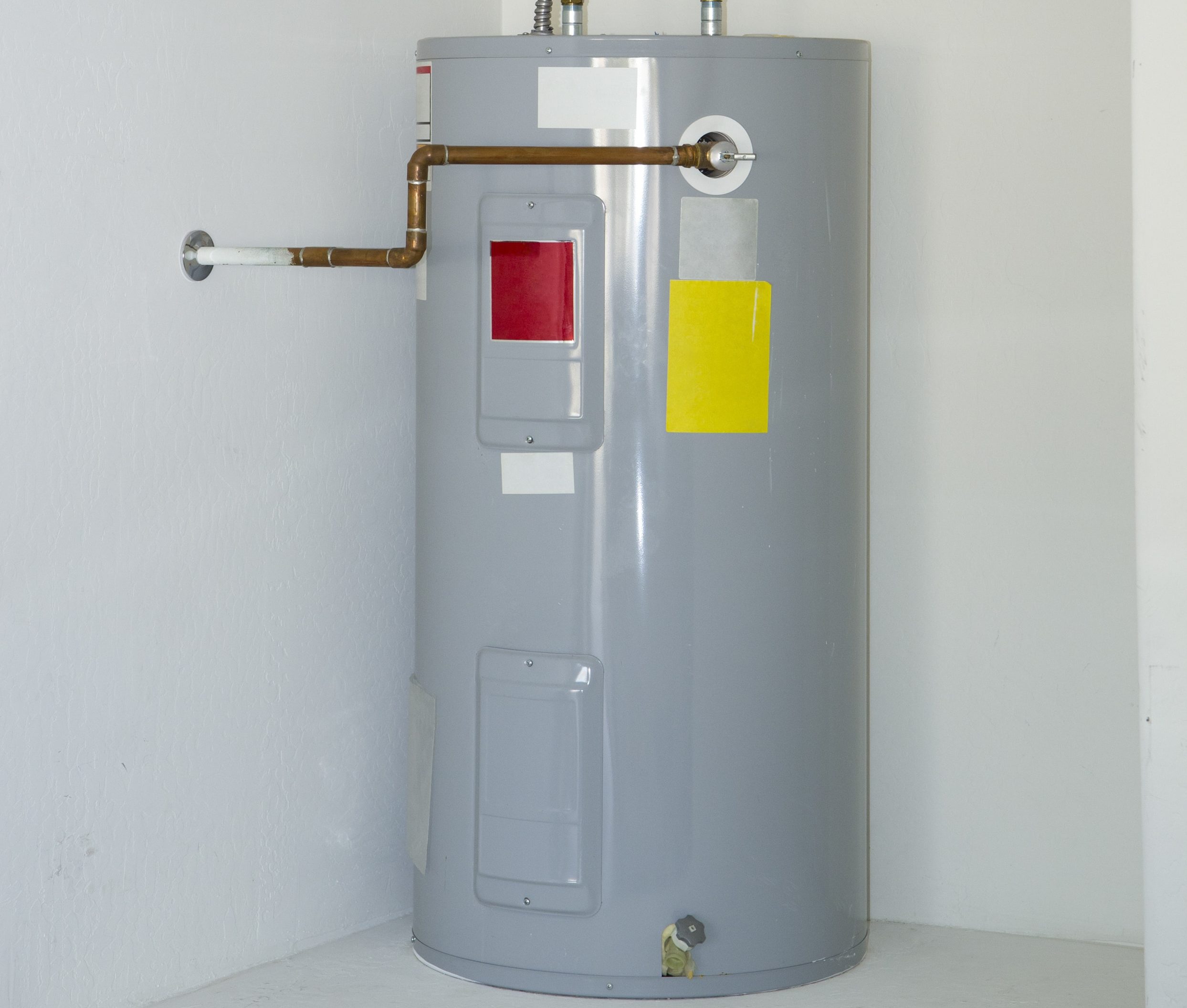
Insulated Residential Energy Electric Water Heater
A tank water heater holds hot water in a big tank that can store 30 to 80 gallons of water. About 90% of American homes use this type of water heater.
The average cost of a tanked water heater is around $840-$2,400, including material and labor costs. Apart from the price being pretty reasonable, they can deliver a huge amount of hot water quickly. However, you must refill the tank after use if it gets empty.
Life Expectancy:
A tanked water heater generally lasts for 8-12 years. However, due to low maintenance and other issues, they might stop functioning sooner.
Installation Time:
The installation process for a tanked water heater is pretty easy. So, it doesn’t take much time to install one. Generally, it takes about 2 to 6 hours to install one.
Pros
Cons
Tankless Water Heater
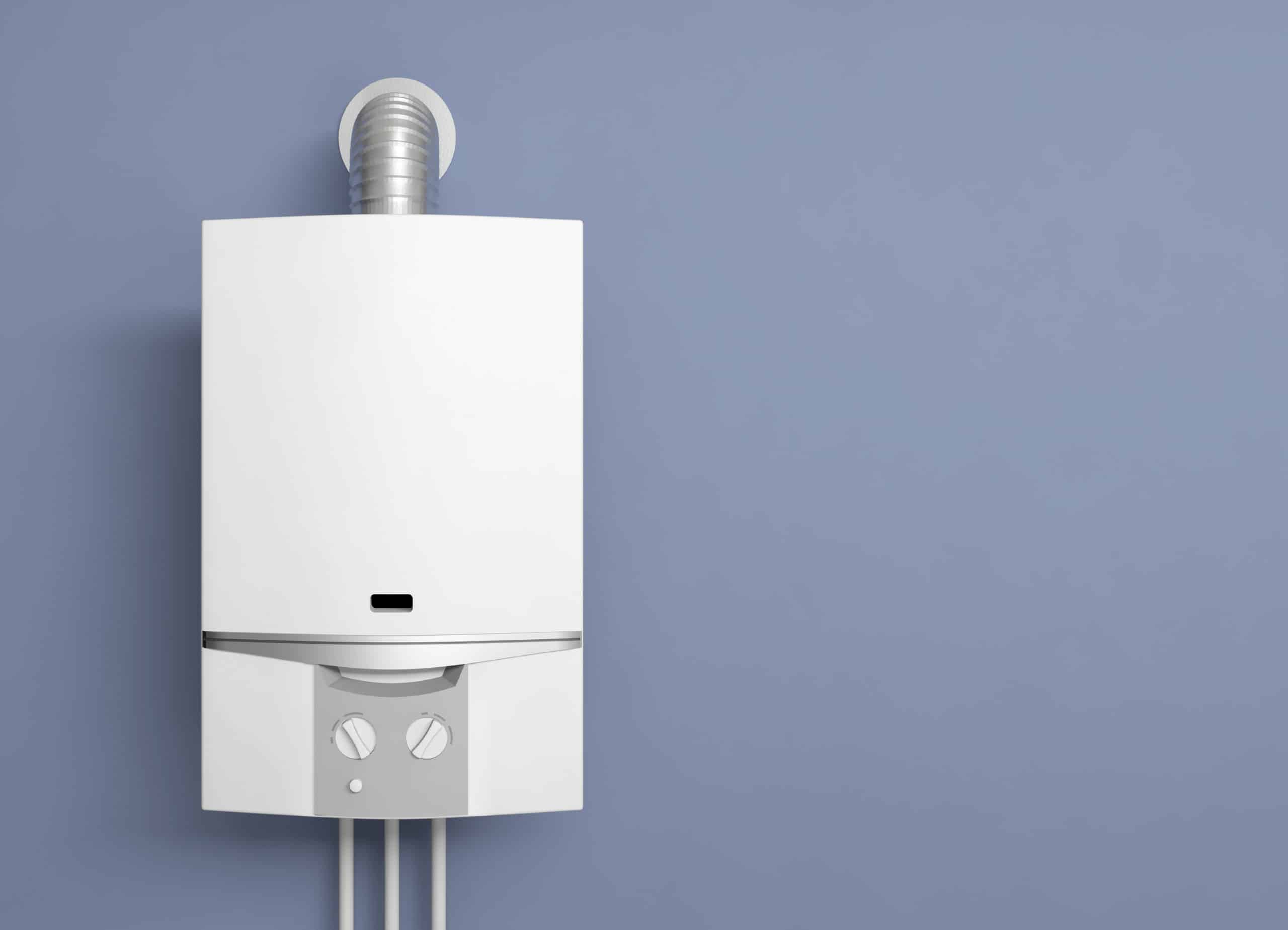
Tankless water heaters, also known as on-demand water heaters, are twice as expensive as traditional tank heaters. They’re more difficult to put together and will cost you extra money in labor. These little, suitcase-sized machines have the benefit of enabling an infinite supply of hot water anytime you need it; thanks to a system of super-heated coils.
Tankless water heaters range in price from $1,200-$3,600 on average. As it doesn’t need a tank to store water, you will end up saving a lot of space. Besides, since it heats the water whenever you need it, it is more energy-efficient too.
Life Expectancy:
The average lifespan of tankless water heaters is 10-20 years. But they generally last more than 20 years if you maintain them properly.
Installation Time:
Since a tankless water heater is difficult to set up, laborers require about 3 to 10 hours to install the water heater. However, the installation time depends on how fluent and professional the workers you hired are.
Pros
Cons
Heater Type
There are many different types of water heaters. For example, gas water heaters, electric water heaters, hybrid water heaters, etc. Depending on the type, the overall cost of replacing the water heater greatly varies. Let’s discuss the cost of a few types of water heaters:
Gas
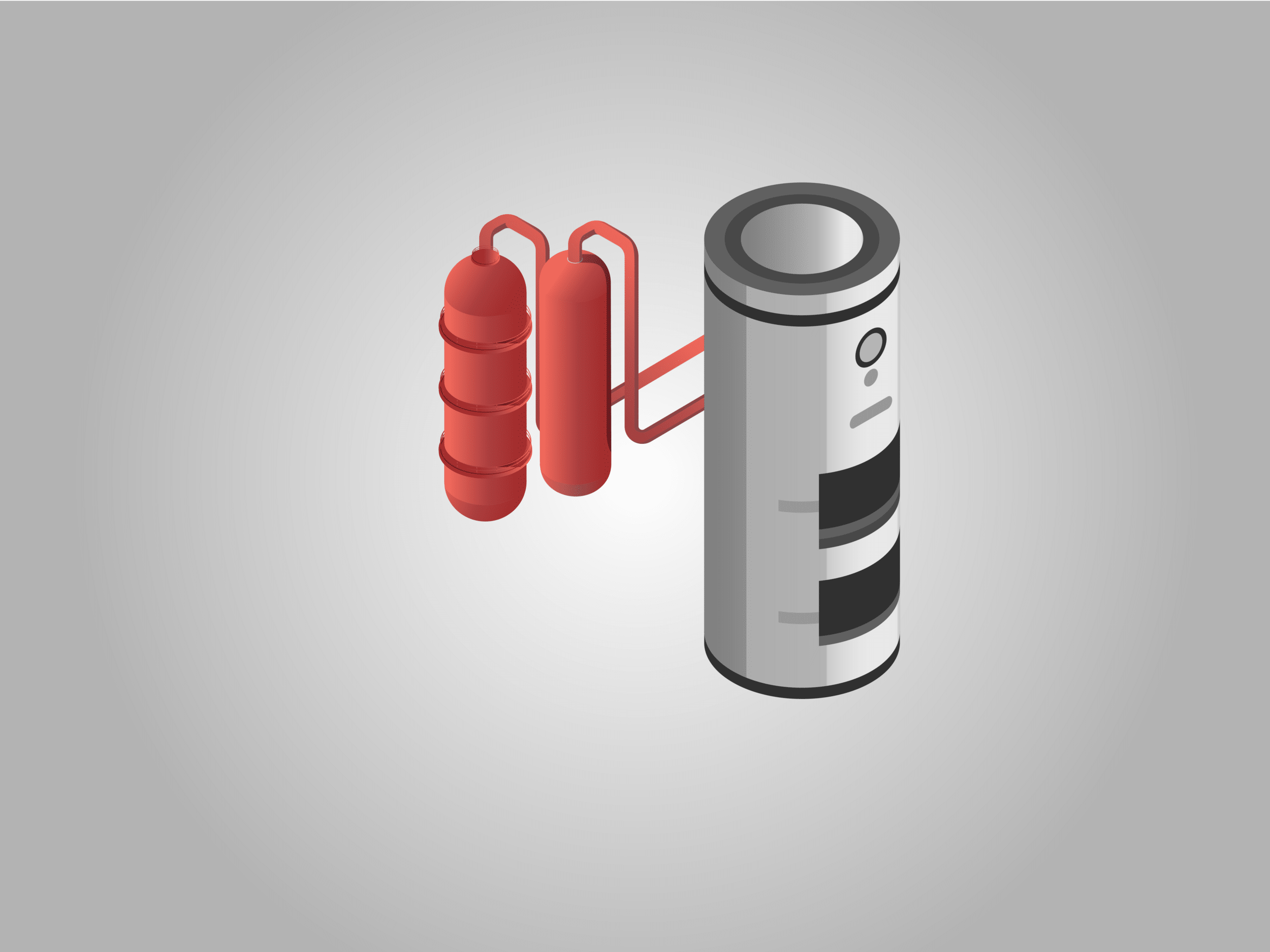
A gas water heater costs between $480 and $3,600, depending on the model. Once the power goes off, gas heaters start functioning. They operate on natural gas, propane 1, and heating oil. So, you have a variety of fuel options to select from, based on your location’s availability and prices.
Well, gas heaters have cheaper operating expenses than electric ones. However, they are not as environmentally friendly as electric heaters.
Electric
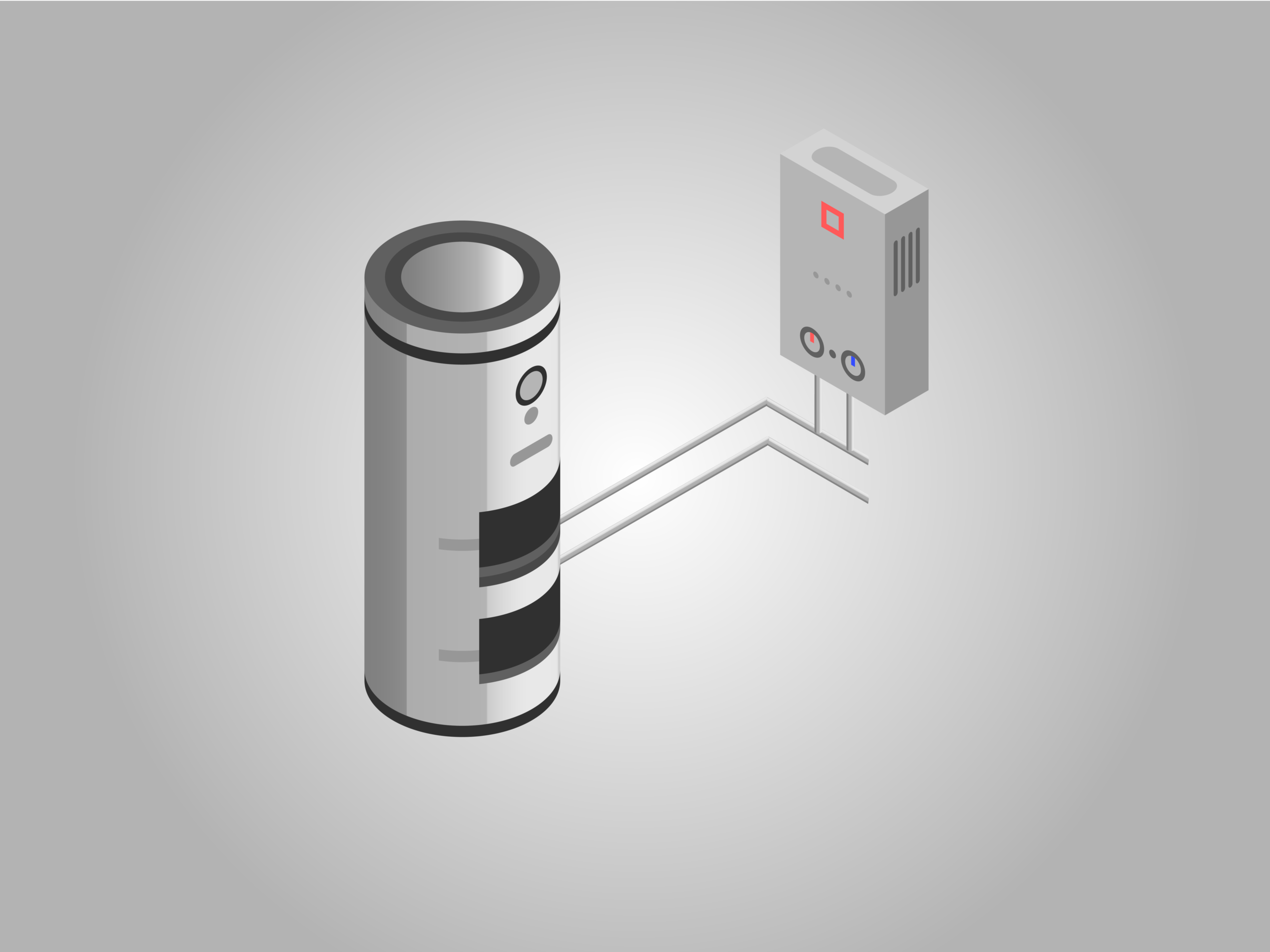
Electric water heaters range in price from $240 to $2,400. They are usually less expensive than gas heaters. They require less upkeep and are far more environmentally friendly, although they are not as efficient overall.
Moreover, the setup might be more difficult. Generally, an electric water heater lasts 2-3 years more than gas heaters.
Solar
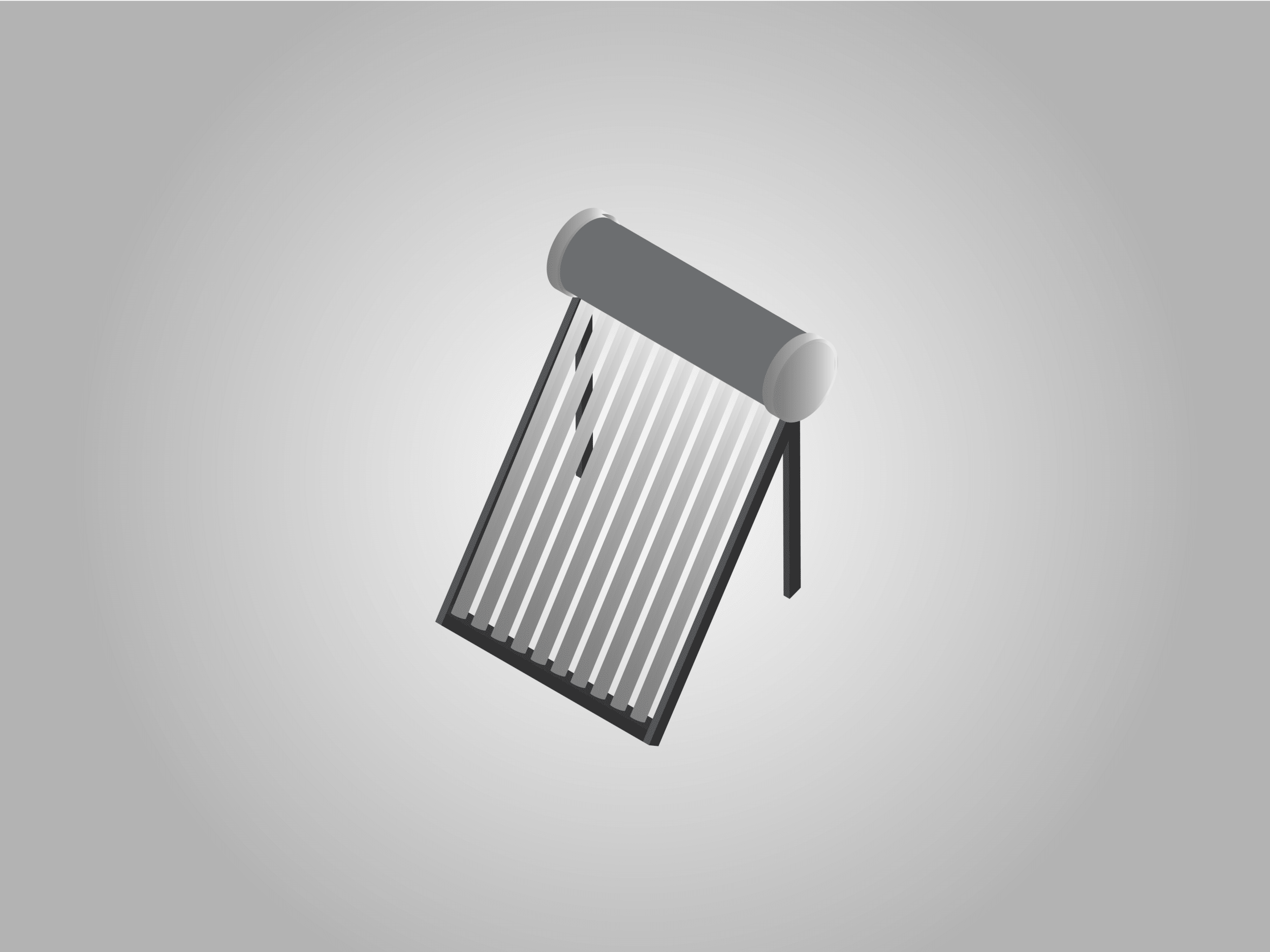
Solar heaters cost about $1,800 to $8,000. To heat the water, solar water heaters utilize solar energy. Though they are one of the most expensive types, you will be able to save money in the long run.
You can save up to 80% of your energy expenditures by installing a solar water heater. Besides, solar water heaters can function in conjunction with electric or gas heaters to create hybrid water heating systems.
Hybrid
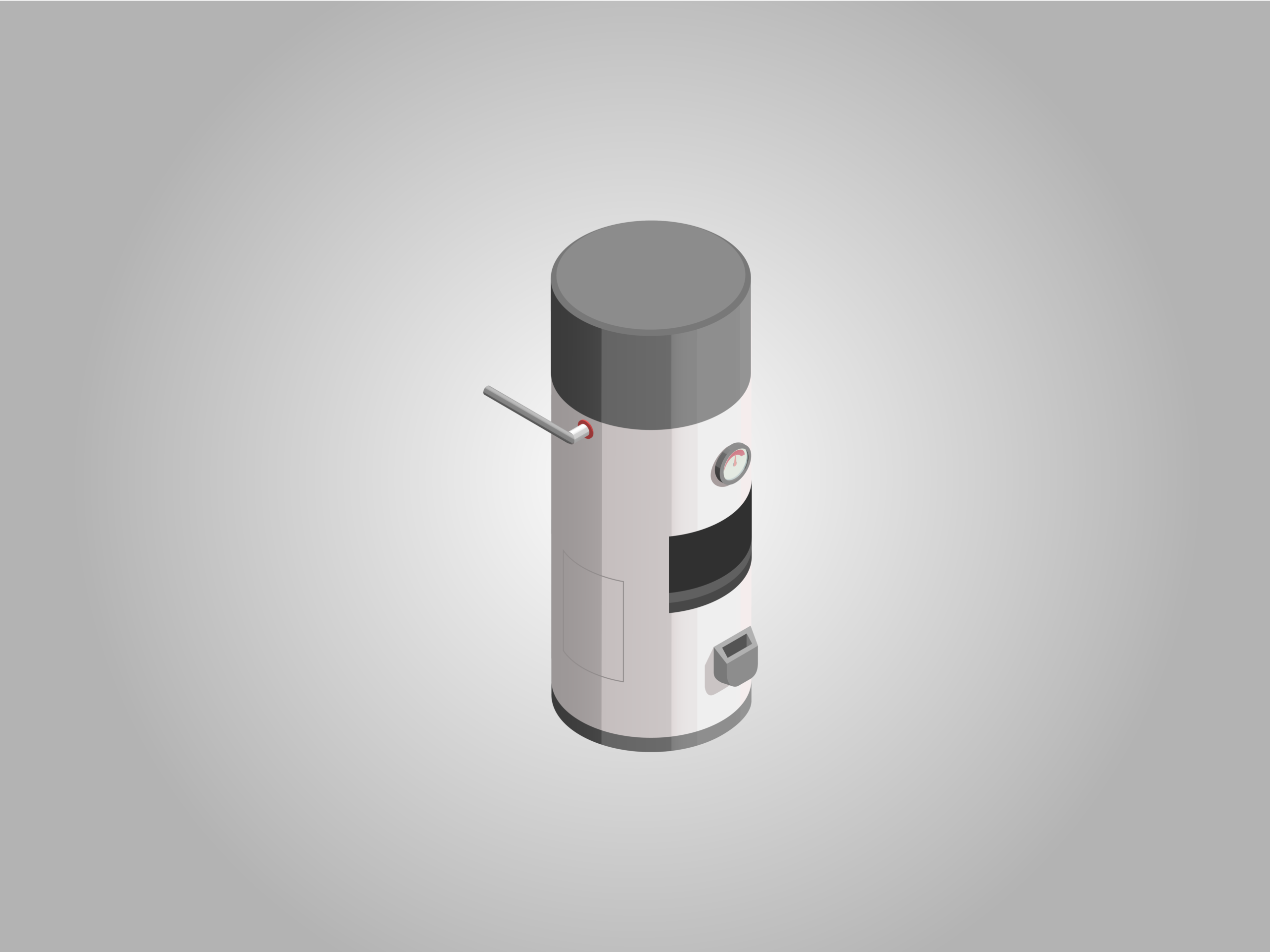
Installation of a hybrid water heater costs between $1,440 and $4,200, including material and labor costs. Hybrid water heaters utilize a heat pump to extract hot air and transmit it to the water in the tank using coils and a compressor.
Heat pumps are big equipment that requires huge space, making them unsuitable for small homes and apartments.
Indirect Heater
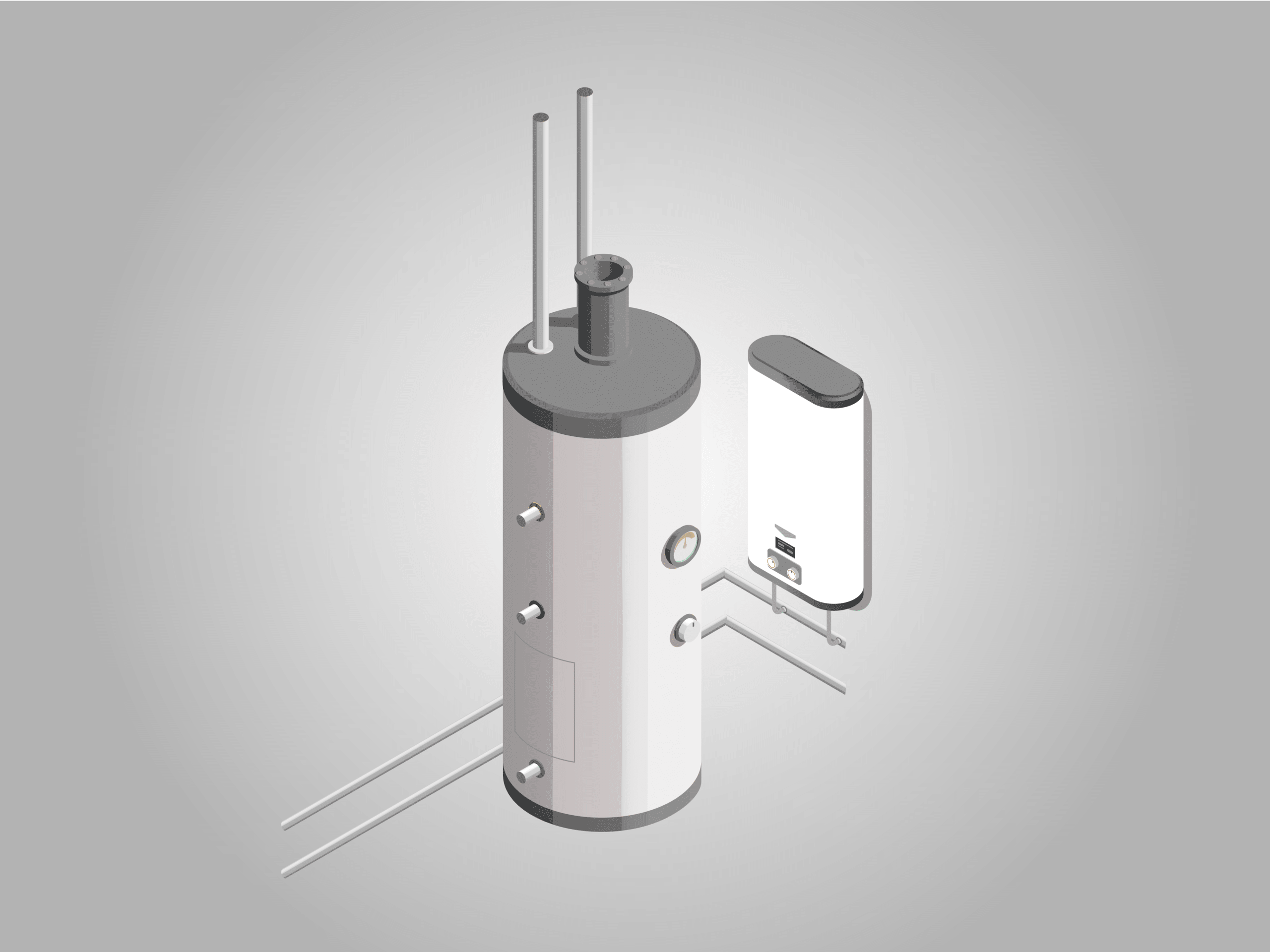
Indirect water heaters heat your water by utilizing the heat generated by your boiler or furnace. Because it is based on the expenses you regularly spend to heat your house, the cost is significantly lower.
However, the installation is more intrusive and expensive and the unit is larger and costs more. The average cost of installing an indirect heater is around $960-$1,800.
Vent Type
There are mainly two types of water heaters based on the type of vent: direct vent water heaters and power vent water heaters. The distinction between these two heaters is how they handle the exhaust fumes produced by fuel combustion. Generally, a water heater with power venting costs $600 to $1,200 more than one with a direct vent system.
Direct Vent
Installing a direct vent water heater might cost anywhere from $420 to $4,800. Purchasing and installing these is both easier and cheaper.
Since they have fewer moving components, they will require less maintenance in the long run. If your heater is close to an outside source, direct vent versions perform well because the gasses don't have to move as far via a chimney to escape.
Power Vent
A power vent water heater costs between $1,260 and $6,000 to install. They have more movable parts and necessitate the use of electricity for ventilation. Even though you heat the water with gas, the water heater will still require electricity to operate. Thus, the procedure will not work if there is a power outage.
It is, however, significantly more efficient in moving exhaust when it becomes functional. You can also put your water heater far away from an outside source and won’t have to bother about the exhaust getting outside.
Brand
Rheem, AO Smith, and Bradford White are among the top water heater companies, with tank units costing $480 to $1,920 on average with a warranty of six, nine, or even twelve years.
The following table shows the cost of different water heaters by brand:
Brand Name | Price Range (30-50 Gallons) |
|---|---|
American Standard | $450-$1,250 |
AO Smith | $480-$4,200 |
Bradford White | $480-$3,600 |
Kenmore | $420-$1,200 |
Rheem | $480-$2,760 |
State | $560-$3,060 |
Whirlpool | $420-$1,800 |
However, keep in mind that the costs mentioned above are for units with a capacity of 30 to 50 gallons. The expenses listed do not include the labor, installation, transportation, and other costs.
Labor Costs
Plumber
$54 to $240/hr
Electrician
$60 to $120/hr
The average labor cost of installing a basic water heater is about $180-$960. The majority of plumbers charge a fixed rate for labor and materials, while some bill by the hour.
The cost of hiring a plumber ranges from $54 to $240 per hour, with most installations requiring between 2 and 6 hours.
Also, you will need an electrician for adding a circuit or switching from a gas heater to an electric heater. The hourly rates of hiring an electrician range from $60 to $120.
Choosing the Right Water Heater
For starters you need to know your budget, select the size and type of the water heater to choose the right water heater for your home. Apart from the ones mentioned, there are other important factors to consider, which we will discuss below.
1. Determine Your Budget
Water heaters come in tons of different price ranges from very cheap to highly expensive. As there are so many options in the market, it is essential to determine a budget. Also, while deciding on your budget keep in mind both initial cost and operating costs.
Consider both installment and operating costs. For instance, gas water heaters are often more expensive to purchase but less expensive to operate than electric ones.
Again, it might be costly to shift from one source of fuel to another. So, keeping in mind all these things, determine a budget plan.
2. Select a Size
You have to determine your water requirements based on the number of persons in your household. As I have mentioned earlier, there are many different-sized water heaters. So, you have to select a size according to your needs before buying one.
Tanked
Household Member | Size |
|---|---|
2 | 30 Gallons |
3 | 40 Gallons |
4+ | 60+ Gallons |
If you have 2 members in your house you would need to invest in a 30-gallon tank. For 3 people a 40-gallon tank will suffice. On the other hand, for a large family of 4+ members, you might need a tank of 60+ gallons.
For tankless water heaters, you have to determine the size by calculating gallons per minute required. For example, 3-5 GPM is generally enough for a family of 2 to 3 members, whereas you would need a 5+ GPM rate for a family having more than 6 members.
Tankless
Household Member | Capacity |
|---|---|
2 | 3 GPM |
3 | 5 GPM |
6 | 5+ GPM |
3. Choose Your Preferred Type
In this article, I have previously covered the majority of the different types of water heaters. So, it might be easy for you now to figure out what type best suits your budget and requirements. I would recommend you to think about a long-term investment while selecting the type of water heater.
Make a list of your priorities and requirements for a water heater and decide which type meets most of your demands. Thus, you will be able to choose the right type of water heater for your home.
4. Consider Efficiency and Performance
Although it might be enticing to buy the cheapest water heater available, these are frequently the most costly to operate due to their inefficiency. Rather a more efficient water heater may be more expensive up front, but it will repay itself in the long run.
A water heater is the 2nd highest source of energy consumption in a residential home, behind the heating/cooling system, accounting for 16.8% of energy usage.
Electric water heaters have star rating labels for energy efficiency. The higher the star rating, the greater the efficiency of the water heater. Well, the maximum possible score is 5 stars. Again, tankless water heaters are substantially more energy-efficient than standard water heaters.
Certified water heaters have undergone extensive testing to ensure that it complies with the most demanding efficiency requirements. So, seek a water heater with a better star rating before making a purchase.
Tax Credits For Your Water Heater Replacement
Investing in a high efficiency system not only saves you money on the monthly bill, but our good Uncle Sam also helps offset the costs with a $300 tax credit for water heaters that meet the following specifications.
Gas, Oil, Propane Water Heaters
Electric Heat Pump Water Heater:
How To Apply For The Energy Efficient Water Heater Tax Credit?
The tax credit is claimed using IRS form 5695. Links to the form are below, although most homeowners don’t file taxes using the manual forms. Simply be sure to note your accountant if you install qualifying equipment.
If you use software such as TurboTax or H&R Block, be sure to make sure that you input the required information -- utilize their chat feature to confirm you have claimed the credit.
Other Important Considerations
1. Choose the Source of Fuel
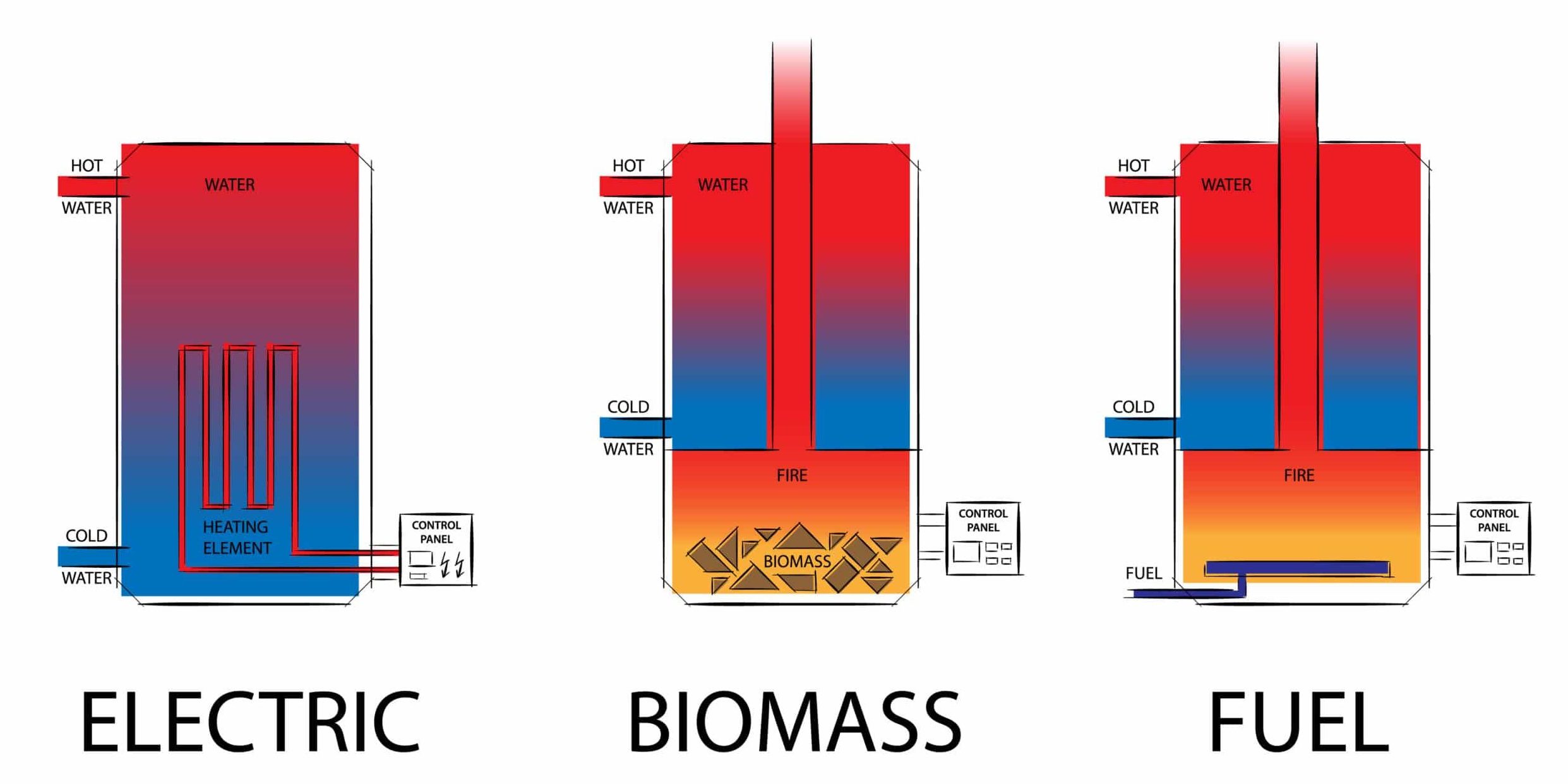
When purchasing a water heater, it is also crucial to consider the heater’s fuel source. Some water heaters work with oil, gas, propane, electricity, and other fuels. All of these fuel sources have their own set of advantages and disadvantages.
However, not everyone will have the same possible options of fuel sources. Based on where they reside, there will be some sources that they might immediately rule out. Depending on where you live in the country, you can save money by choosing the right fuel source.
Also, if you are constructing a new house, a geothermal heat pump system can be a good investment.
2. Availability of Space
The available space for setting up a water heater is also an essential factor to consider before buying one. A traditional water heater is large and bulky, and it can take up a lot of room in your home. A tankless water heater, on the contrary, is much smaller and takes up far less room than a traditional tank.
So, if you don’t have enough space to install a tanked water heater, you have to consider buying a tankless one. Don’t just buy a water heater in a hurry before measuring the available area in your home so that your money doesn’t get wasted.
3. Warranty Offers
You can have peace of mind with a longer warranty period. Well, entry-level water heater models often come with a six-year leak warranty and a one-year parts warranty, whereas higher-end models might have 12-year guarantees.
However, remember that the warranty won’t cover the water heaters that are not linked to a safety valve!
The Process of Replacing a Water Heater
After you’ve settled on a budget and the type of water heater you want, you’ll need to hire a professional plumber to complete the replacement. Once you are done with hiring a professional team, they will start working on the water heater replacement project. The following is a step-by-step process for replacing a water heater:
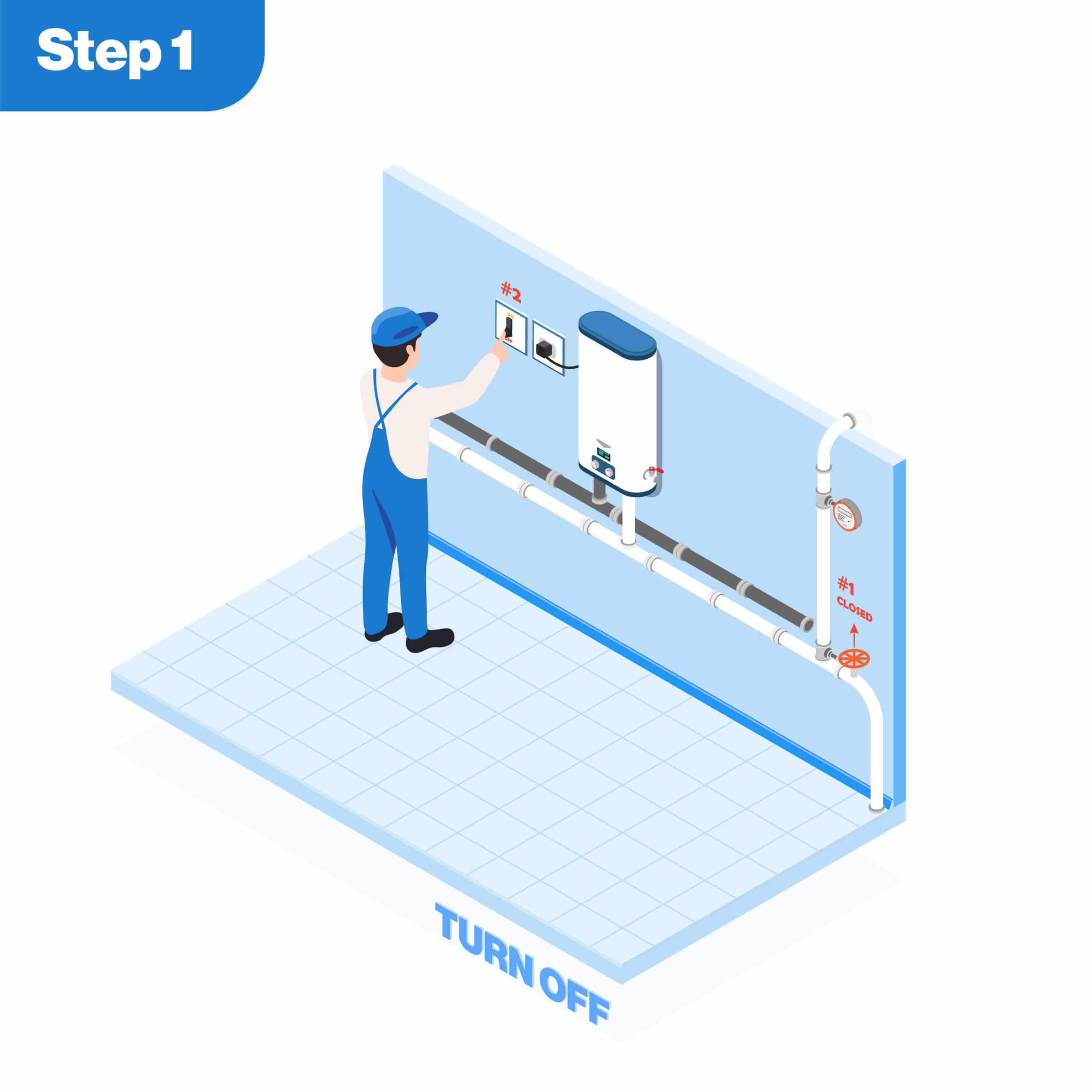
Turning Off the Water, and the Electricity or Gas
It is essential to turn off the water heater’s power. The professional you hired will shut down the water at the main water shutoff valve in the house or a branch shutoff valve that controls the cold water running to the water heater. After that, he will turn off the electricity or gas.
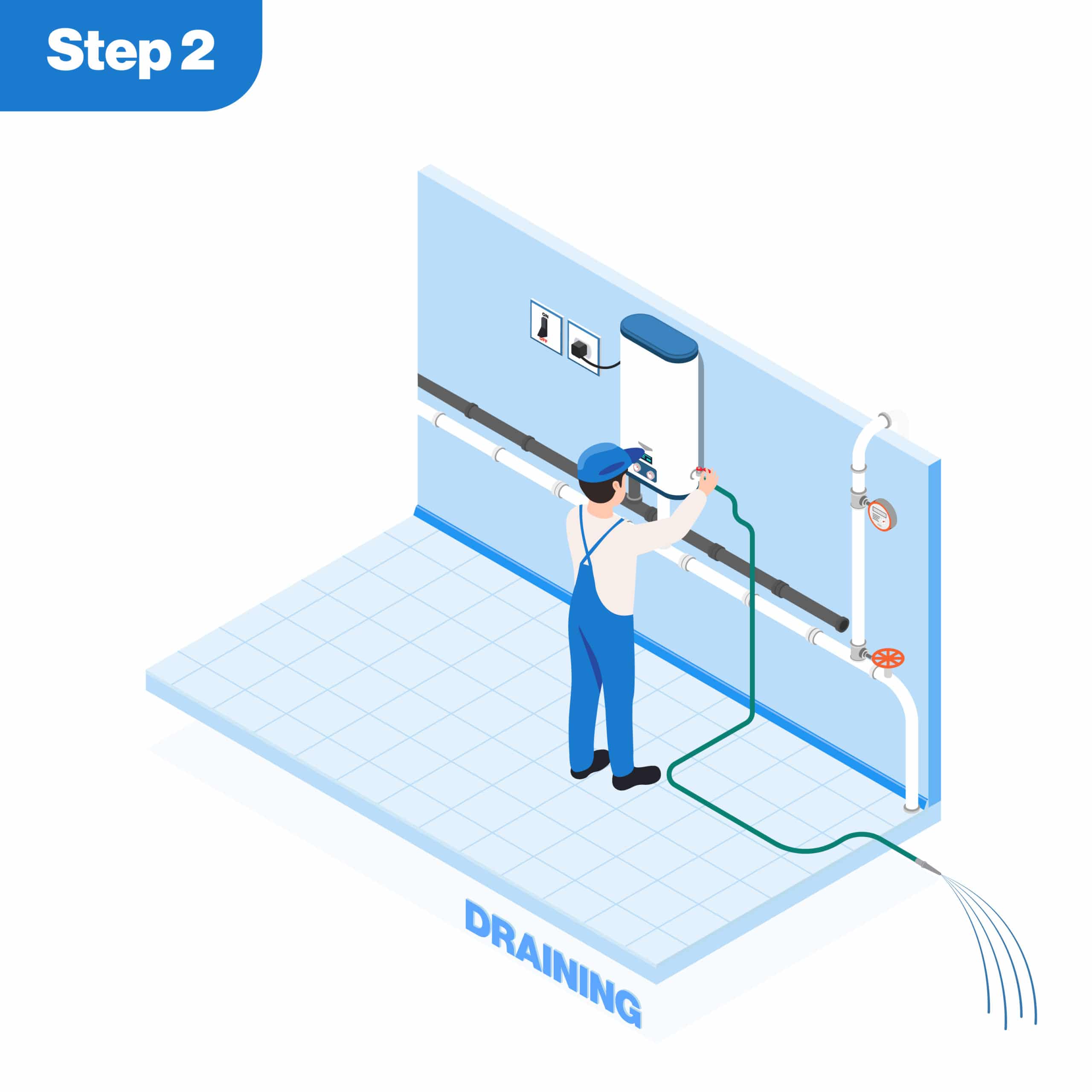
Draining the Tank of the Water Heater
The professional team will then connect a garden hose to the water heater’s drain valve towards the bottom. To avoid suction in the lines, which might delay draining, it is best to open the closest hot water tap. Now it’s time for setting the hose’s other end in a floor drain or taking it outside.
Slowly open the drain valve to prevent sediment from clogging it. Allow the tank to entirely drain before turning the valve off and removing the hose.
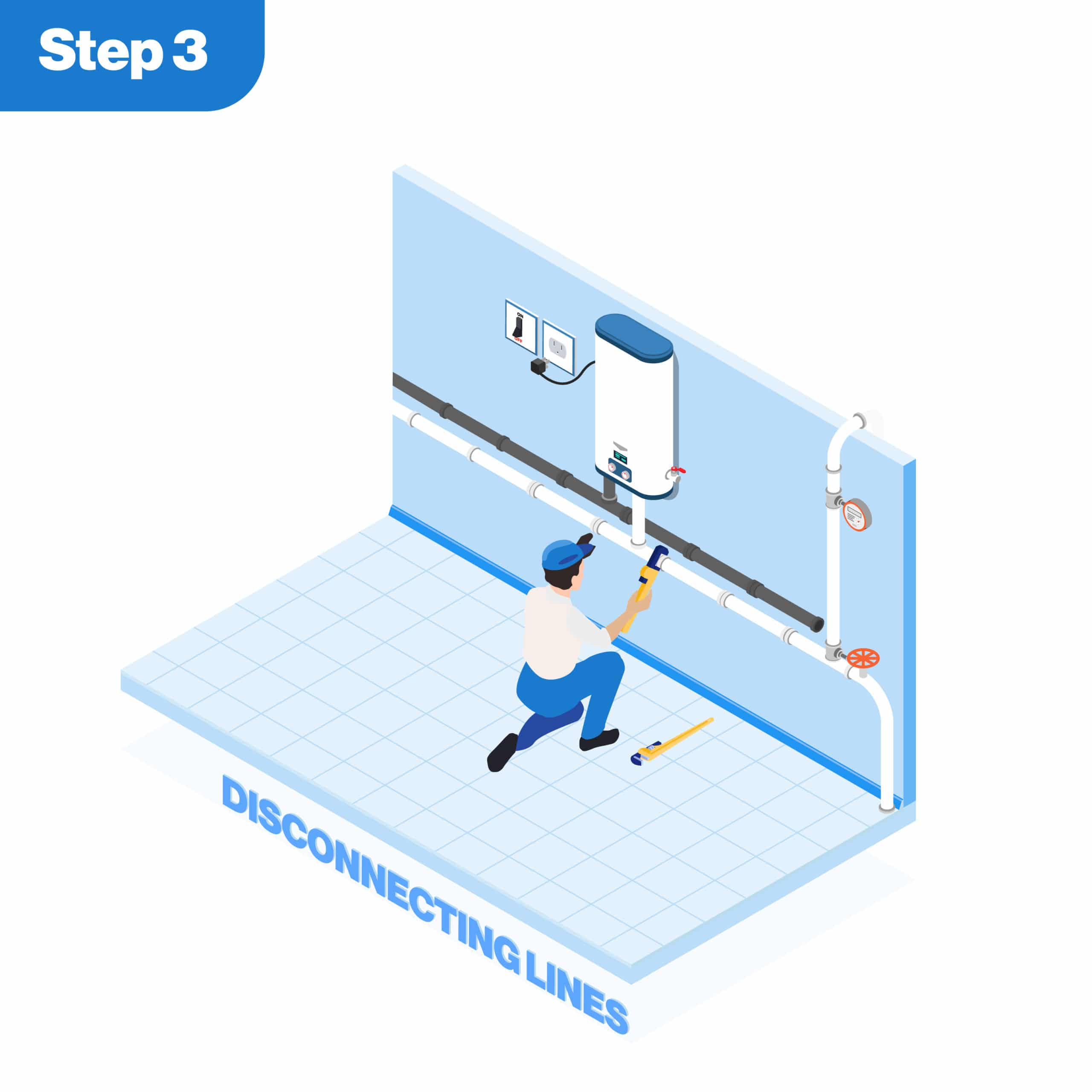
Disconnecting the Water Lines, and the Electricity or Gas Line
Disconnecting the water lines, as well as the electricity or gas lines is a must. The professionals generally use channel-lock pliers or a pipe wrench to disconnect the cold and hot water lines from the water heater. After that, the water heater’s power supply must be turned off totally.
For electric heaters, the professionals must remove the lid from the top of the water heater’s wiring connecting panel. Examining the individual wires with a voltage tester to ensure the circuit is turned off is necessary. Then, they will remove the wire connectors connecting the wires of the circuits to the leads of the water heater.
On the contrary, for gas water heaters, the team has to detach the gas line from the gas control valve after making sure the valve on the main gas line is not on.
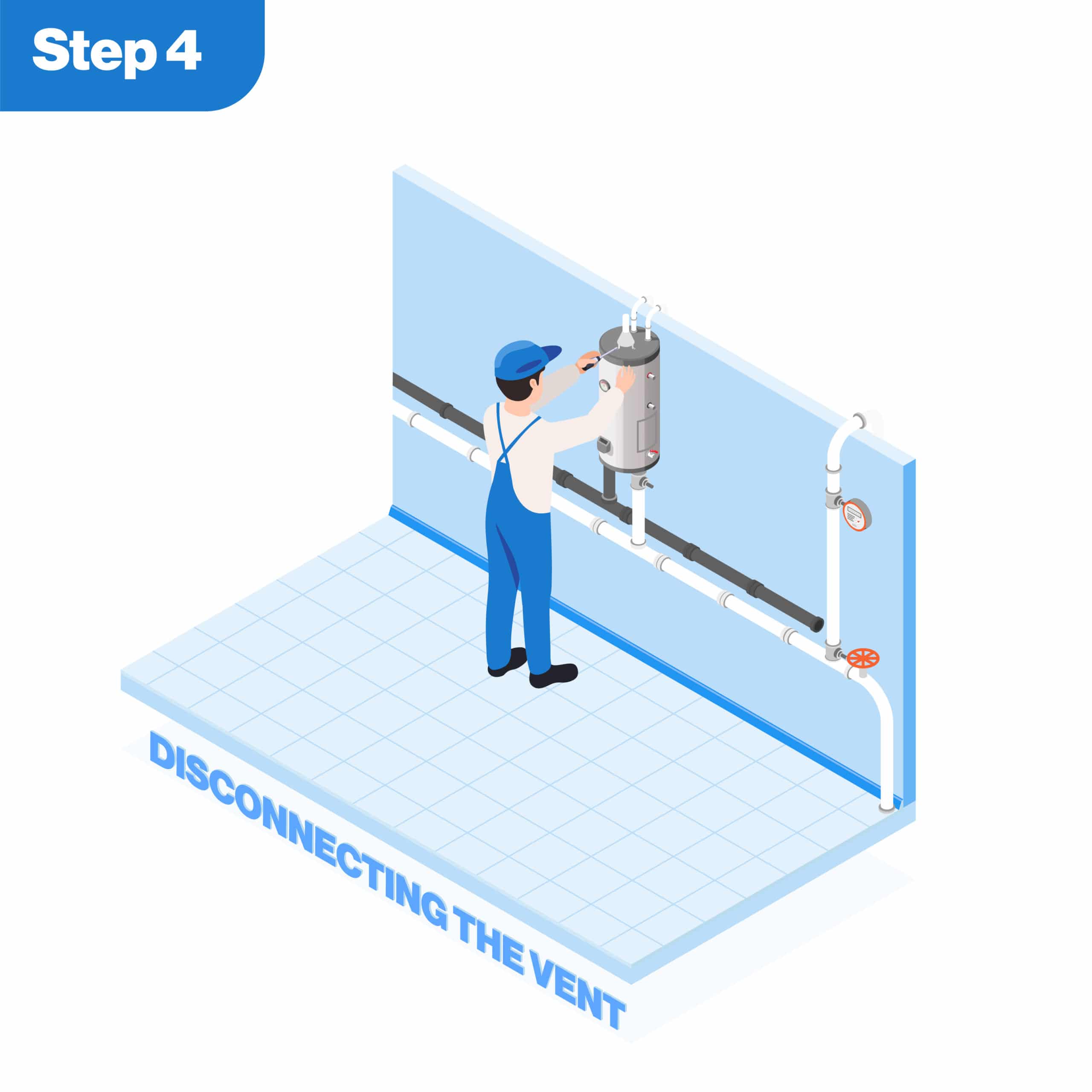
Disconnecting the Vent if It’s A Gas Water Heater
If your previous water heater’s fuel source was gas the professionals will have to do this step. They will remove the vent pipe from the heater's draft hood.
Generally, four to five sheet metal screws are enough for attaching the draft hood to the vent pipe. However, you might be able to utilize the draft hood again if it’s in good condition.
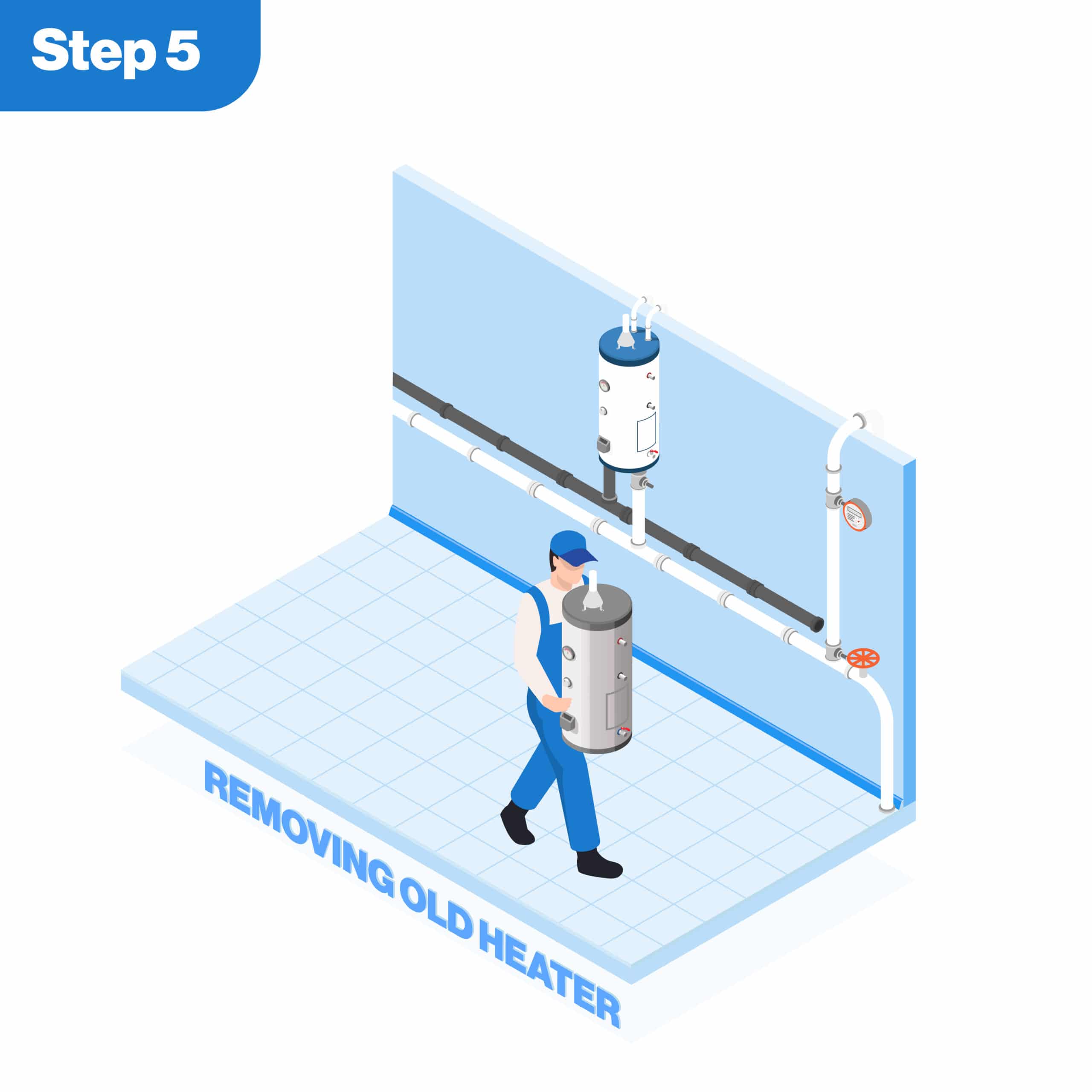
Removing the Old Water Heater and Place the New One
Now the professional team will remove the old water heater and place the new one at its place. It is better to wash the area before placing the new water heater. While removing the heater, make sure it is securely strapped to the dolly.
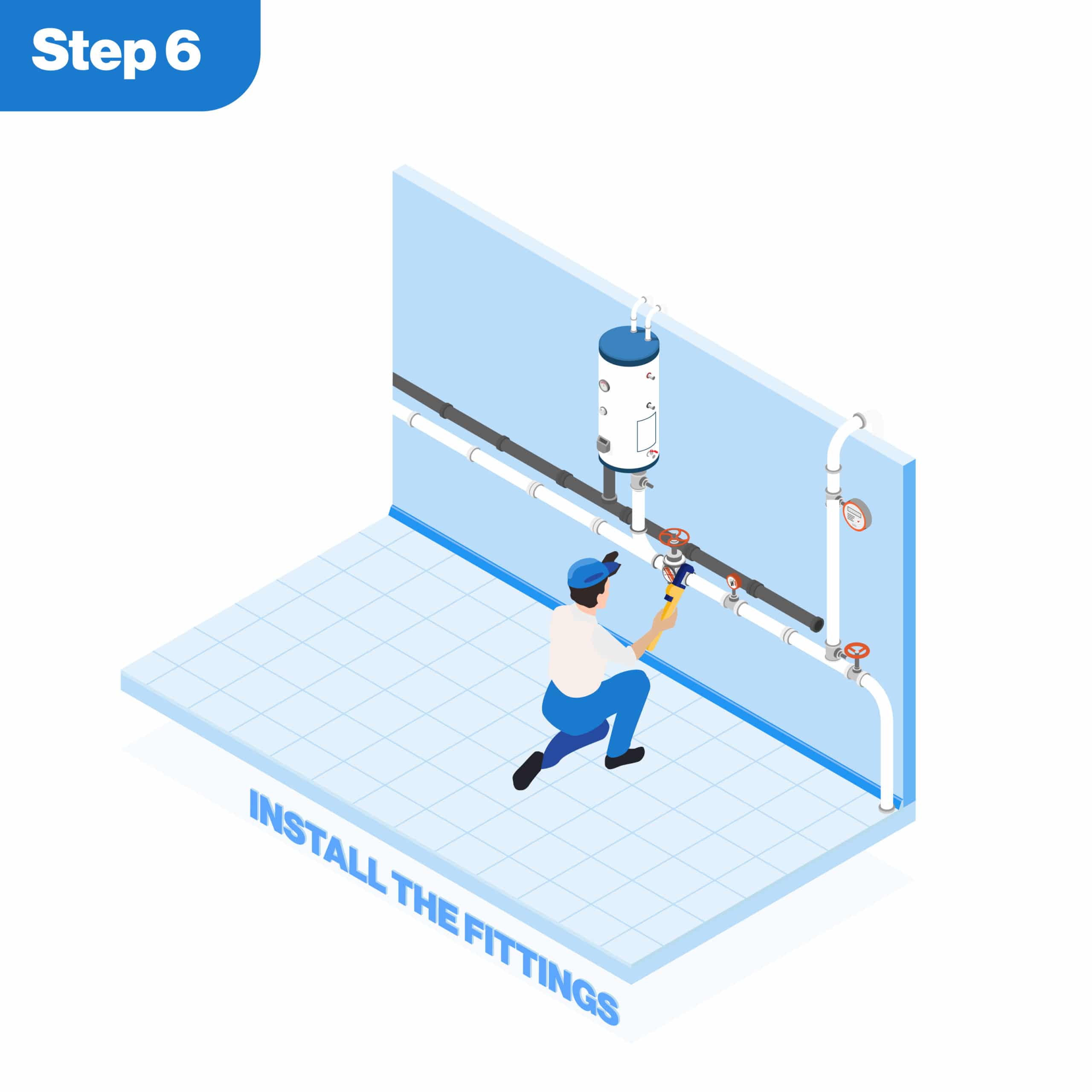
Install the Pressure Relief Valve and Other Fittings
Now, it’s time to install all the fittings, along with the pressure relief valve and discharging drain pipe. The professionals will attach the new valve with a pipe wrench, then connect the tube to the valve’s aperture.
The pressure relief valve must be attached to a wide circular aperture towards the bottom of the heater. Also, it is essential to ascertain that the aperture is pointed downward.
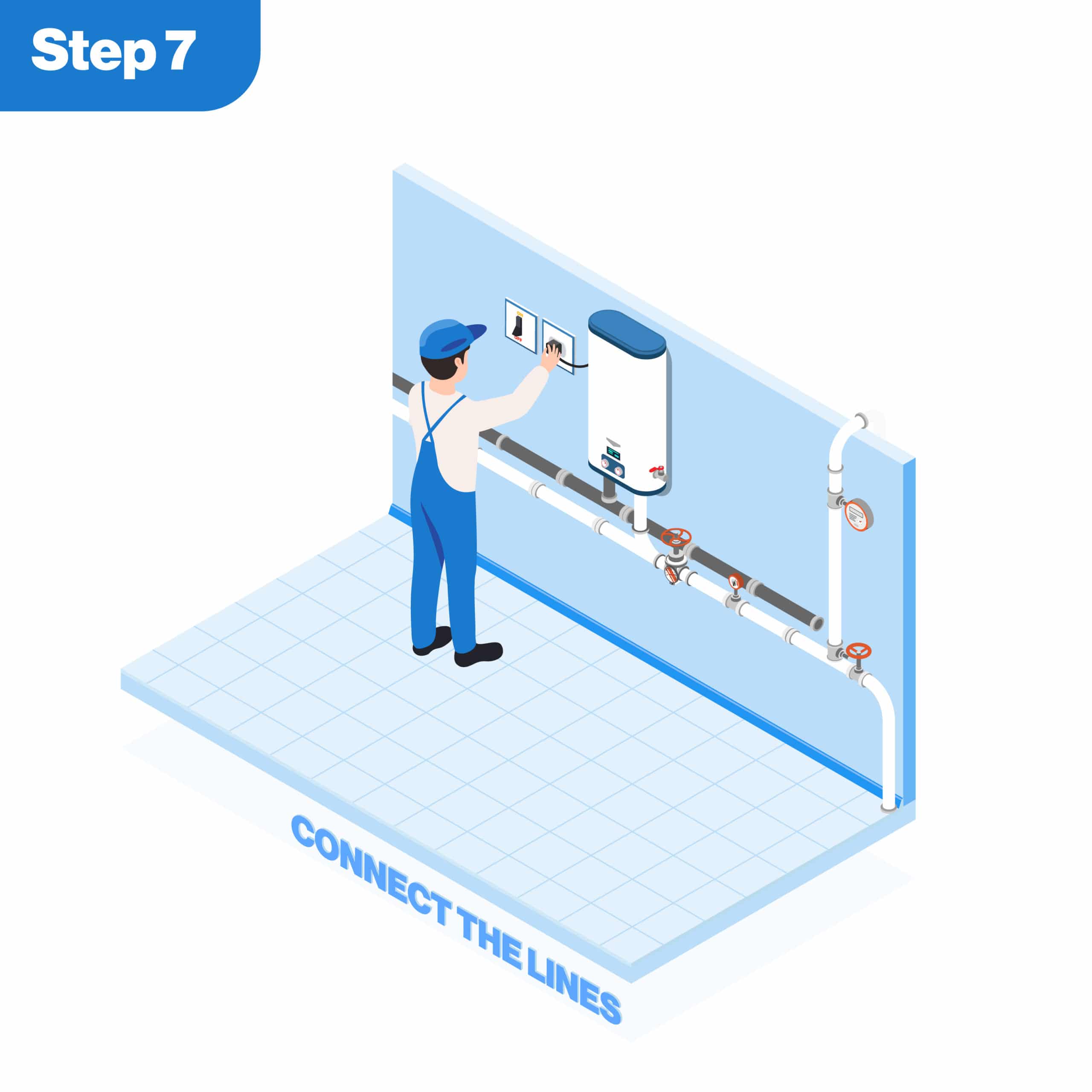
Connect the Water Lines, and Electricity or Gas Line
At this step, they will connect the cold water input and hot water outlet ports on the top of your water heater.
If yours is a gas water heater, they will join the gas line to the control valve for the gas burner. If necessary and permitted by local code, it is best to use a flexible gas line. After connecting, they should turn the gas supply valve on and wipe down the gas union and all gas joints with soapy water to look for leaks.
For an electric heater, the professional team will link the circuit wires to the leads of your water heater. Then, they will cover the wire connection box with the cover plate.
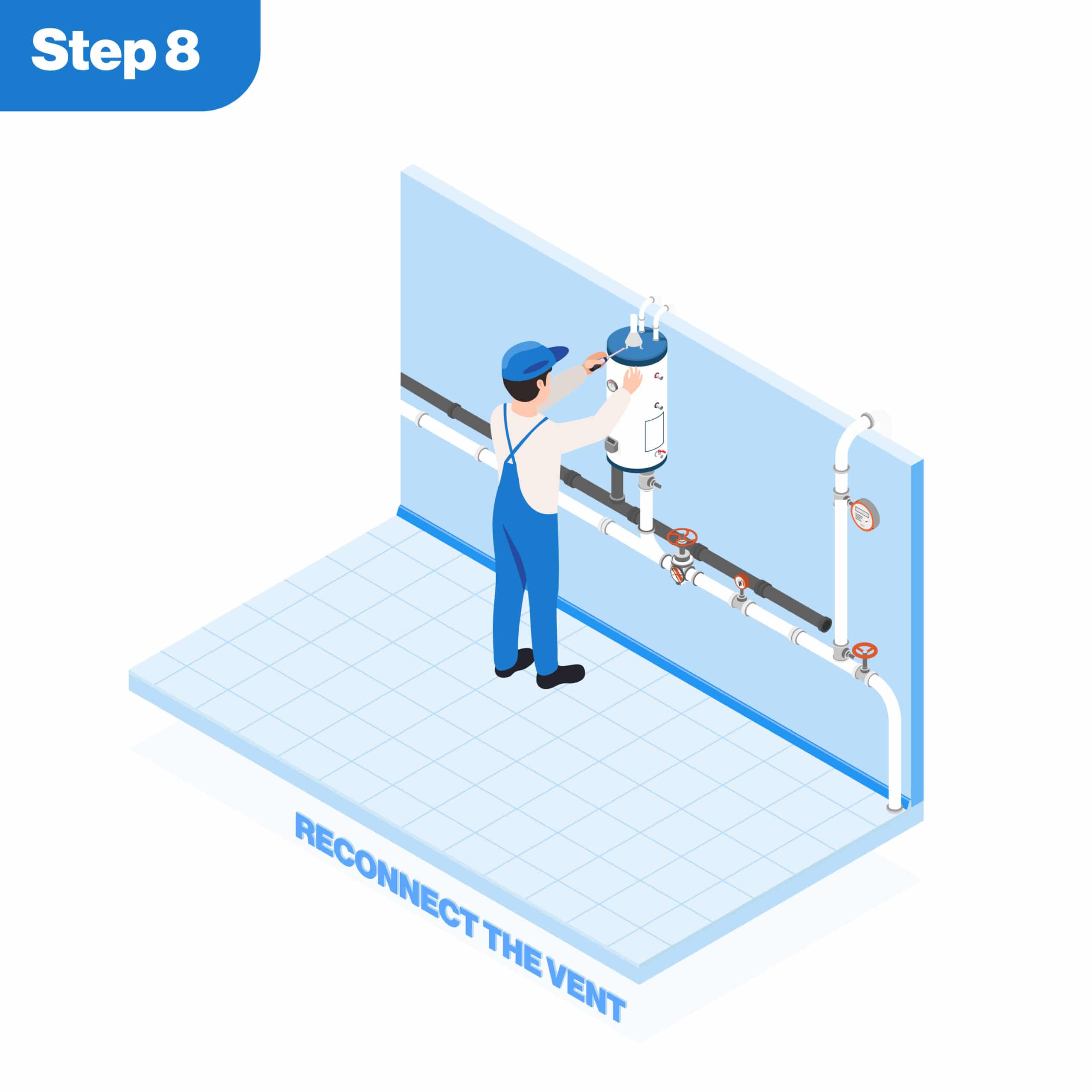
Reconnect the Vent If It’s A Gas Water Heater
Again, this step is only for gas water heaters. The plumber will insert the drafting hood into the vent pipe, positioned above the exhaust opening.
He might use sheet metal screws to hold it in place. Be sure to check if the professional team is connecting the vent according to the manufacturer’s instructions and local code requirements.
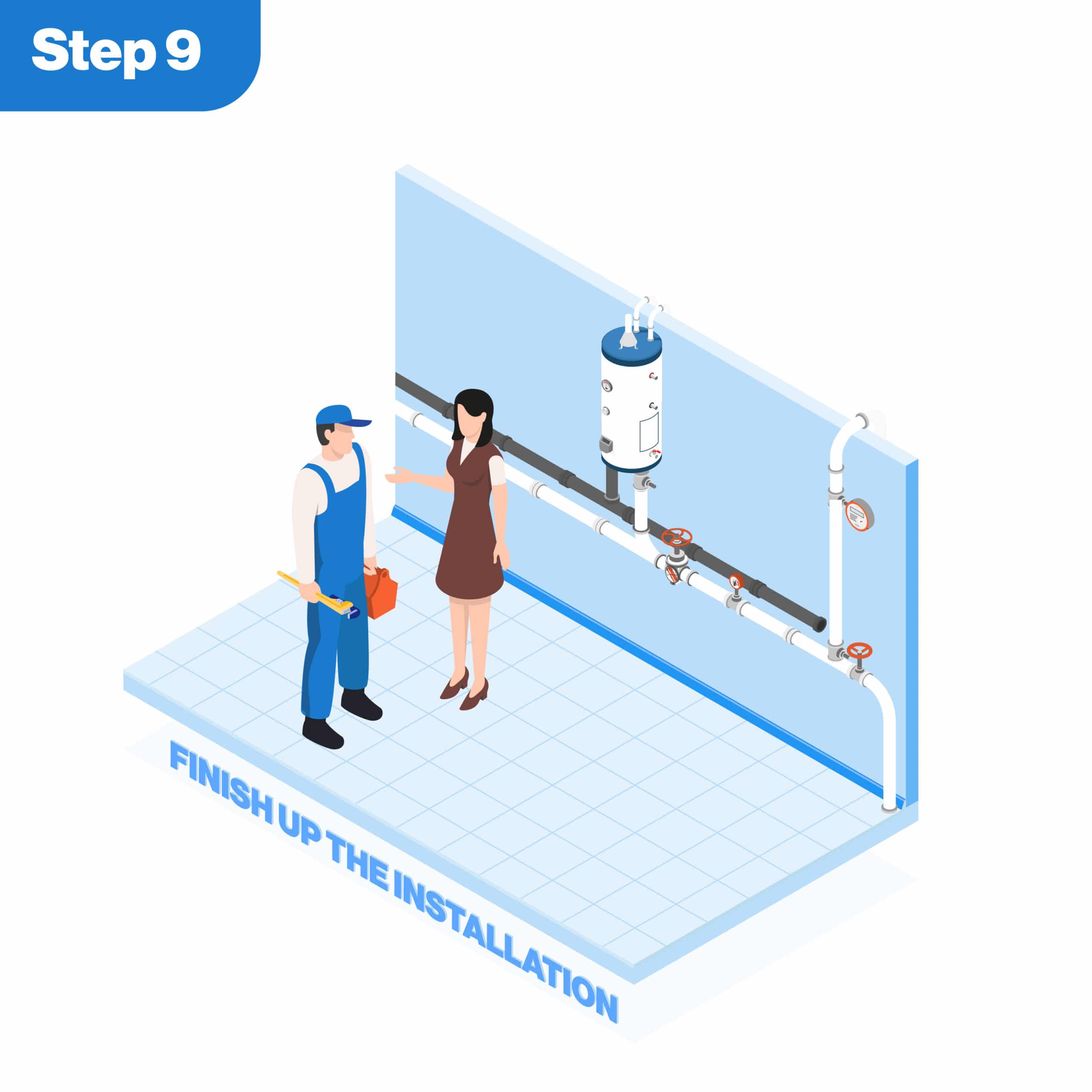
Finish Up the Installation Process
Switch on a hot water tap in a far corner of the home, then turn on the water heater’s cold water supply valve and let the tank fill with water. Once the hot water tap starts to flow, it means the tank is full.
Adjust the water heater’s thermostat to a setting around 110 to 125 ° F and wait for the water in the tank to warm up.
The professional team will examine if the water heater is doing its job perfectly or not. Besides, it would be best if you check the water heater by yourself before the professional team leaves.
When to Replace Your Water Heater?
Replace a water heater if it is more than 10 years old or if the cost of repairing seems to be more than 50 percent of the replacement cost.
Well, although most water heaters are built to last ten years or longer, they might stop working suddenly and need to be replaced over time. So, rather than coping with an unexpected breakdown, it’s a good idea to keep an eye on your water heater for symptoms that it’s nearing the end of its useful life. Here are some of the reasons for you to replace your water heater:
Rusty or Discolored Water
If your water starts to turn a rusty or unusual color, it is an indication that the heater is corroding. The heater has started corroding means the anode within has failed.
So, it means you have to replace your heater as soon as possible so that you can save money in the long run.
Weird Taste
If you notice that your water has a strange taste, it might be time to replace your water heater. A strange metallic taste in the water could be an indication of corrosion within the heater. So, not only is it necessary to replace the water heater at this time to avoid sudden failure, but it is also essential for your health.
Loud Noises
Sometimes you might hear strange sounds, such as clanging, pounding, bubbling, or whining. These sounds and the popping or cracking noises coming from the heater could imply that the heating source is failing. So, when you start hearing these noises, it would be best if you consider replacing the water heater.
Leaks
Heater leaks are a major concern and could indicate a massive internal breakdown. If you discover any leaks, turn off the system’s power and contact a professional as soon as possible. However, it is a bad idea to spend a lot of money on repairing rather than get a new water heater.
Low Water Temperature
Low water temperature might indicate that the water heater’s heating element is having an issue. If your water is not becoming as warm as it used to be, there is a chance of a faulty heating element or sudden failure of the water heater. Thus, it is a good idea to replace your water heater before it breaks down.
Too Old Water Heater
Now, if your water heater is more than ten years old, it is unlikely to last much further. So, it might be time for you to consider replacing the heater. However, tankless water heaters tend to last longer than tanked ones.
If you replace a water heater before it breaks, it could save you money in the long run by preventing leaks and costly water damage. Moreover, new water heaters are more energy-efficient, which will help you reduce your utility bills.
Common Water Heater Part Repair And Replacement Cost
Gas and electric water heaters are the two most common types. A gas system uses a gas flame to operate, whereas an electric system utilizes electronic components or coils. However, they both have different parts that might suddenly stop functioning and require repair or replacement.
Let’s discuss the cost of repairing or replacing some common parts of both gas and electric water heaters:
Electric Water Heater
The most typical problems with these types are tripped breakers and malfunctioning heating elements. If the issue is not with the breaker, any of the following parts might have the problem:
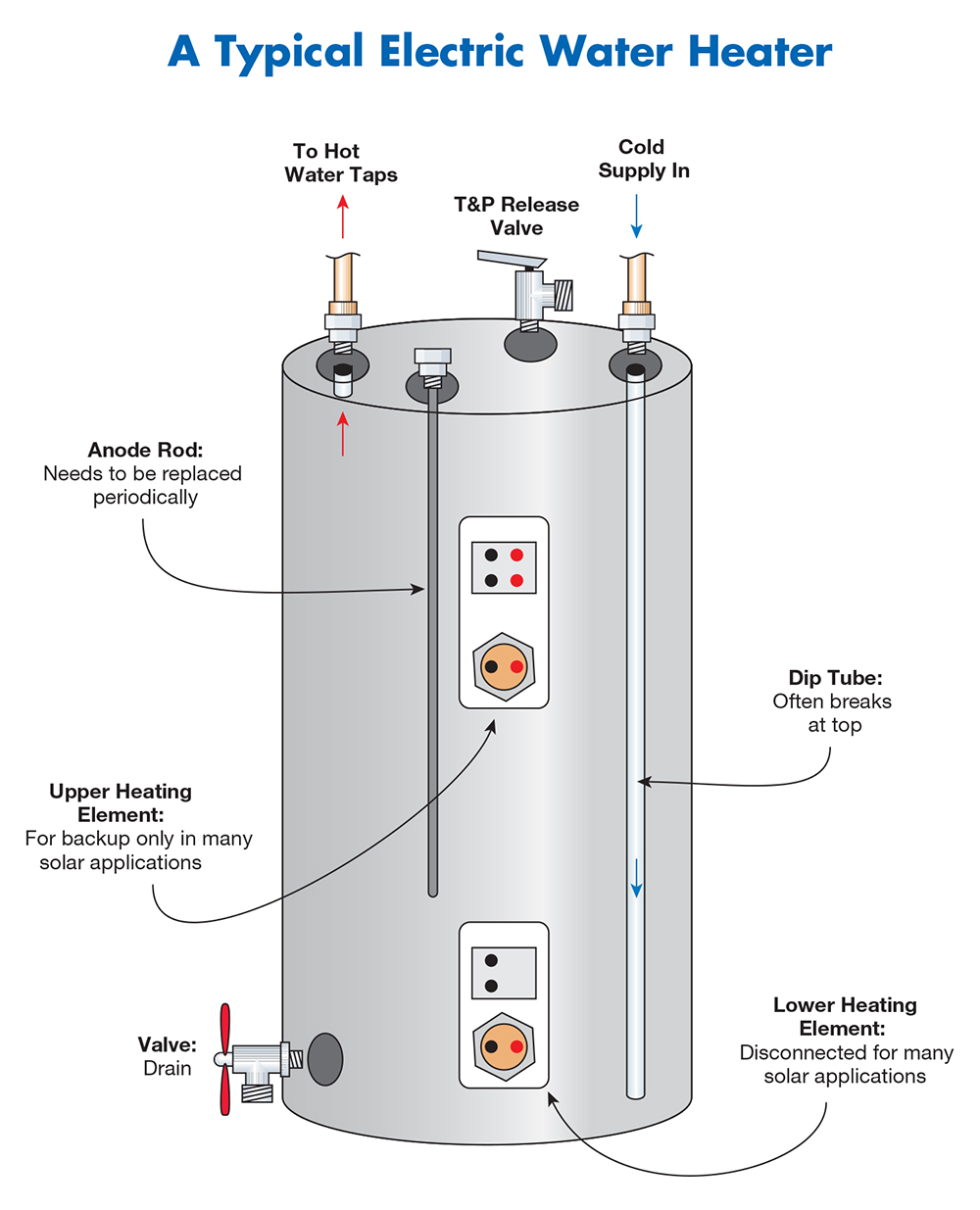
Source: Water Heater Rescue
1. Heating Element
If your element has a problem, it will most likely cost about $240 to $360 to repair. Each unit contains two of them, one is on top and the other on the bottom. Your water heater won’t be capable of generating hot water if the top part fails.
Well, most elements are under $24. You can use continuity testers, costing up to $12 to assess these elements’ functionality.
It takes time to replace one, therefore labor costs are significantly higher. You might have to spend more than $360 in total for replacement. This will, in most situations, be a long-term solution. Generally, it is not necessary to replace the heating element frequently.
However, don’t forget that this part is exposed to extremely high voltages of electricity and can be extremely dangerous to use. Before inspecting and fixing the heating element, be careful to turn the electricity off.
2. Thermostat
The parts are pretty affordable. A new thermostat will cost between $24 and $36. Considering the labor expenses, the overall cost of hiring an expert to fix or replace a thermostat ranges from $180 to $240.
Every element of the heating system has its own thermostats. If the elements are in good working order, the issue is most probably with one or two faulty thermostats. A professional can simply replace them without having to remove the elements.
3. Anode Rod
The anode rod costs between $24 and $60, and you can execute the replacement process on your own with the right instructions and procedures. However, it will cost around $300-$360 to have a professional replace it.
Well, the anode rod prevents your tank’s inside from corroding. It accomplishes this by attracting corrosion to itself. Your water will be a rusty hue and may have an odd smell and/or flavor if the rod has corroded substantially.
It is possible to increase the lifespan of your water heater by replacing the anode rod before corrosion affects the inside of the tank. Most professionals recommend replacing anode rods every five years. If your tank’s interior is badly rusted, you must consider replacing the whole water heater.
4. Dip Tube
These parts, which convey cold water from the top of your tank to the bottom, are found in both electric and gas models. Your water will not get heated properly if your dip tube disintegrates or breaks off in the tank.
The price of dip tubes is not much. They normally cost $12. However, it will cost you around $180 to replace them professionally.
5. Pressure Relief Valve
The pressure relief valve serves as a safety precaution if the pressure within the tank rises to dangerous levels. It relieves your tank of excessive pressure. Thus, the tank could start to leak if the valve fails. It can cost anything between $24 and $240 to repair a pressure valve.
There are a variety of conditions that can cause the valve to fail. It gradually wears out with time in most cases. In other circumstances, it might be clogged with too much silt. However, this is typically an issue for a professional to handle in either case.
Gas Water Heater
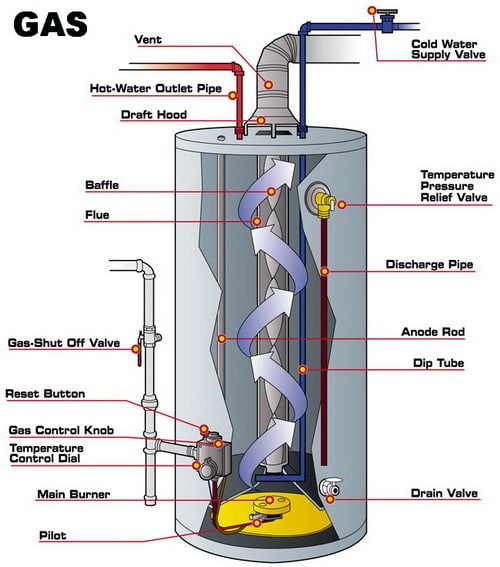
Source: Remove and Replace
A gas water heater is harder to evaluate than an electric water heater. The power source is generally the cause of problems with gas heaters. A gas heater, in particular, may experience problems with any of the following parts:
1. Pilot Light
A pilot light might go out for a variety of reasons. This can happen if the gas is turned off temporarily. Furthermore, a pilot light can go out with time. Plumbers can easily reignite the pilot light. They will charge you between $48 and $180 each hour. However, this is usually a quick project that takes less than an hour.
You might be able to save some money by relighting the pilot light yourself. But only undertake this if you are confident in your ability to follow the instructions in the manual that came with your water heater. Without proper safeguards, messing with gas water heaters can be pretty dangerous.
2. Thermocouple
The thermocouple detects when the pilot light is turned on and signals the gas control valve to keep the gas flowing. If this part breaks, the gas control valve won’t release gas since it won't be able to precisely identify the existence of the flame. Thus, it won’t be possible to turn on the pilot light and the burner.
Well, if your thermocouple quits operating, the only choice is to replace it. Installing a new thermocouple by a skilled plumber should cost no more than $240. You will only have to pay the cost of the part, which is around $24 if you complete the work on your own.
3. Gas Control Valve
If your thermocouple and pilot light is working perfectly, you might need to replace your gas control valve. When this part fails, replacing it is frequently a better and more cost-effective alternative than repairing it. It is one of the most costly gas heater repairs, costing you around $360 to $600.
However, keep in mind that this is an emergency service requirement. It is a difficult and risky process. So, I would recommend you hire a professional to do this job as soon as possible rather than trying to do it yourself.
Why Hire A Professional?
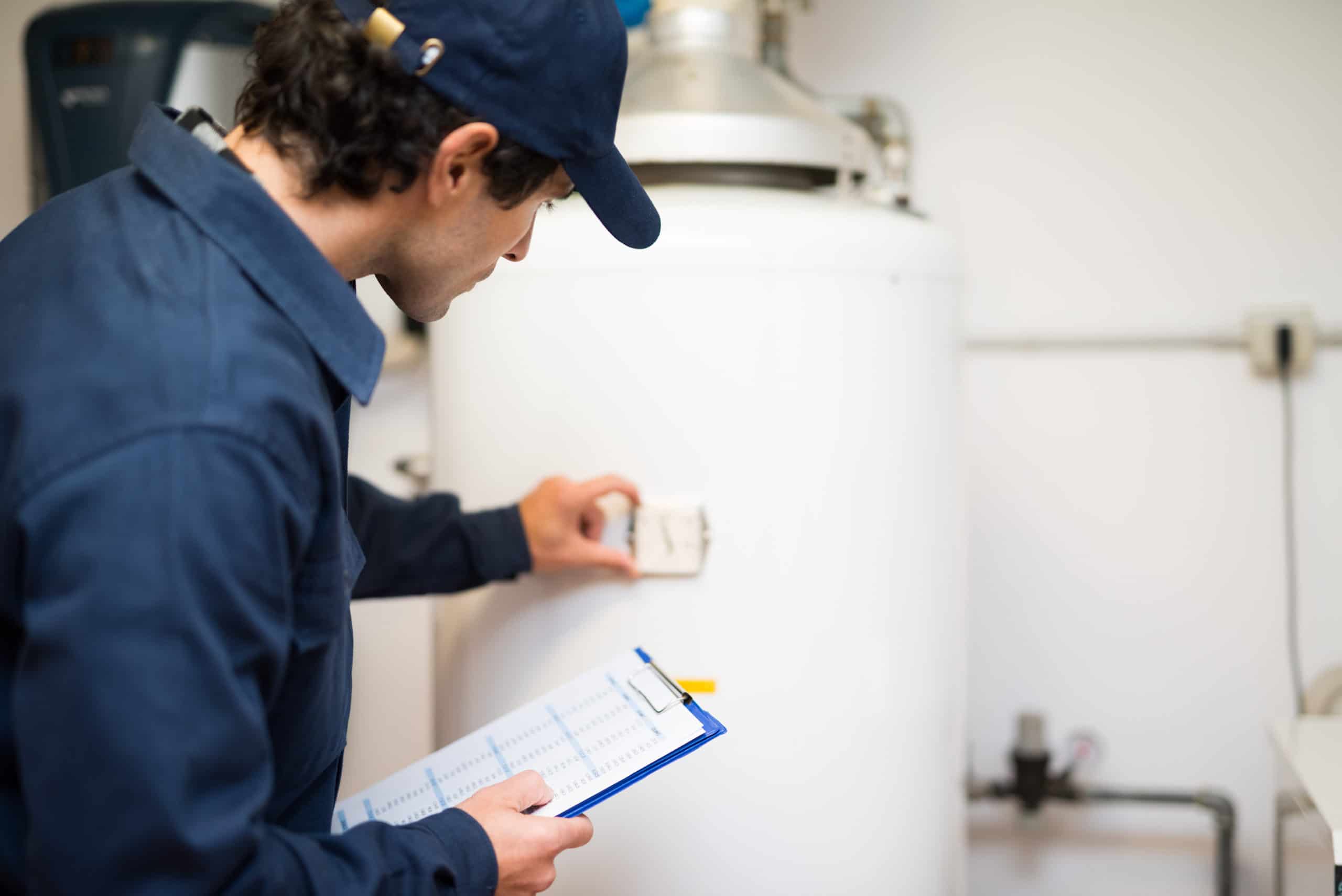
You should hire a professional to replace a water heater to avoid the risks of explosion, fire, and carbon monoxide poisoning. Besides, the professional has the best knowledge of installing or replacing a water heater quickly and smoothly.
Although many people are capable of replacing the water heater seamlessly and smoothly, it is probably a safer idea to hire a professional plumber to do the task.
Regardless of whether the water heater is fueled with gas or electricity, there are potential risks. Since gas leaks are exceedingly harmful, it is a must to securely seal the gas lines. Moreover, it is possible to avoid carbon monoxide poisoning if the water heater is adequately ventilated.
If you hire a professional they will do the sealing and ventilation job perfectly for you. Not only that, it will save you a lot of time and ensure your peace of mind.
Professional plumbers are also familiar with all of the current and changing safety regulations that must be followed during the replacement or installation procedure. Moreover, when you choose a professional, you can rest assured that they will stick by their work and take accountability for any problems that arise during the installation.
Also, if a professional does the job, it is unlikely to arise issues with the water heater soon. So, it is a good idea to hire a professional to replace or install your water heater so that you can save your time and money in the long run.
Frequently Asked Questions
A 20- to 30-gallon tank or a tankless water heater might be appropriate for small families living in studio apartments or small houses.
Most plumbers charge $54-$180 hourly. Generally, the installation process requires six to eight hours of labor, costing a total of $324-$624.
The average cost of installing a 50- gallon water heater is about $580 to $2,760. The expense can be higher or lower depending on the type of water heater you choose.
Tanked water heaters generally last for 8 to 12 years. On the other hand, tankless water heaters last much longer than tanked ones. Tankless water heaters have a lifespan of 20+ years.
To heat water to 120o, a 50-gallon water heater might take 1 to 2 hours for electric water heaters. However, a gas water heater will only require 30 to 60 minutes for heating the water.
Well, it is possible to replace a water heater for homeowners who have enough knowledge and plumbing skills. But hiring a professional is a good idea to ensure safety.
Based on the model, utility rates of your area, and fuel source, water heater operating costs range from $15 to $60 a month, or $180 to $720 annually.
Conclusion
Well, that’s all you need to know about water heater replacement and every aspect of the costs associated with it. You should always be vigilant about when to replace your heater and when to repair it. I advise that you always hire a professional to at least diagnose your problem. That way you can make the most appropriate and cost effective decision.
